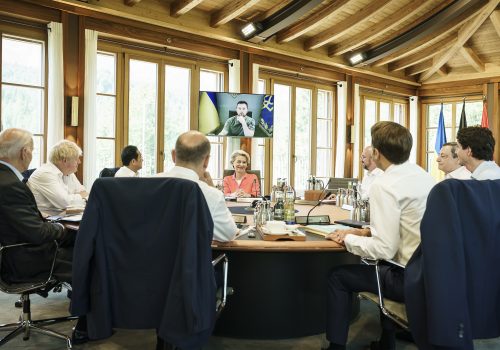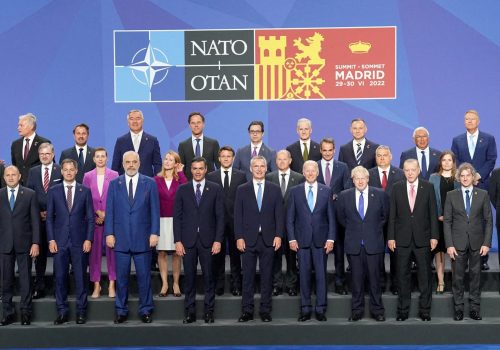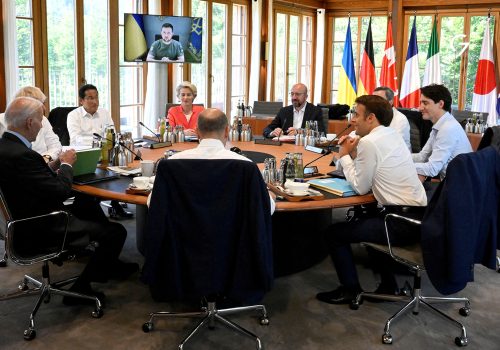What does a post-Boris Britain look like?
JUST IN
Time for a changing of the guard. Following another ethics scandal, British Prime Minister Boris Johnson announced today that he’ll be moving out of Downing Street—and thus closing a wild chapter in his country’s modern history. But just like the Brexit he helped deliver, Johnson’s departure raises major questions about the United Kingdom’s future on the world stage. From both sides of the Atlantic, our experts weigh in on the next act for Great Britain.
TODAY’S EXPERT REACTION COURTESY OF
- Ben Judah (@b_judah): Senior fellow at the Europe Center and veteran British journalist
- Frances Burwell (@FranBurwell): Distinguished fellow at the Europe Center and senior director at McLarty Associates
- Peter Westmacott (@PeterWestmacott): Distinguished ambassadorial fellow at the Europe Center and a former British ambassador to the United States
- Peter Dickinson (@BizUkraineMag): Editor of UkraineAlert
A HOUSE IN DISORDER
- In Ben’s assessment, Johnson’s attempt “to rule presidentially, even royally,” led to his undoing, as cabinet ministers and aides turned on him en masse in recent days. Johnson’s departure, after he held on defiantly for weeks, was a stark reminder that the United Kingdom “remains a parliamentary system, where leaders serve at the pleasure of their MPs,” he tells us.
- In the end, Ben adds, Johnson’s tenure might well serve as “a warning to future prime ministers about how you can personally fritter away an eighty-seat majority,” as polls have shown the Labour Party overtaking Johnson’s Conservatives.
Subscribe to Fast Thinking email alerts
Sign up to receive rapid insight in your inbox from Atlantic Council experts on global events as they unfold.

ACROSS THE CHANNEL—AND THE ATLANTIC
- In Brussels, Fran tells us, “Johnson’s resignation has probably brought some quiet sighs of relief that a very difficult partner is now leaving the stage.”
- But it also leaves the United Kingdom’s European partners asking a series of key questions as the search for Johnson’s replacement gets underway: “Will the new Tory leader be able to work with Brussels after s/he has emerged from the struggle? Or will the country first need another general election before sanity returns to the UK’s relations with its biggest trading partner?”
- Currently, the biggest sticking point with Brussels is the drama over the border between Ireland and Northern Ireland—with Johnson seeking to overrule the Northern Ireland Protocol negotiated during Brexit—and Fran notes his departure “is likely to delay any resolution.”
- Even if Labour wins a new election, it doesn’t mean London and Brussels will suddenly become chummy, Fran points out. “Still, Labour has never seen as many fratricidal splits as the Tory party over relations with the EU,” she adds. “And a new Labour government would most likely climb down on the major issues over the Protocol, such as the role of the European Court of Justice” in resolving disputes involving EU law within Northern Ireland.
- Peter W. says the Northern Ireland row has also touched a nerve among Irish-Americans, who worry about undoing the fragile peace established by the 1998 Good Friday Agreement: “The White House and others will be hoping that Johnson’s successor is less keen on enacting unilateral legislation in Westminster to alter the Northern Ireland Protocol.”
- Overall, it’s too soon to tell what Johnson’s resignation means for the special relationship between London and Washington. “Relations with the Biden administration have been correct,” Peter W. tells us, “but damaged by the sense amongst Democrats that Brexit was a bad policy for America and for Europe, mis-sold by Johnson and his allies.”
FRIENDS IN NEED
- Meanwhile, in Ukraine—where Peter D. says the British leader is beloved for his steadfast diplomatic and military support for Kyiv amid Russia’s invasion—Johnson’s departure “will spark considerable disquiet and speculation.” But Ukrainians shouldn’t worry, he adds: “The short answer is that there are unlikely to be any major changes in the UK’s Ukraine policy.”
- That’s in part because, as Ben points out, “the British senior civil service is not politically appointed, so much of this network will stay in place. London without Johnson will not drop Kyiv.”
- Peter D. notes that Ukraine is one of few issues that unites all candidates in the race to fill Johnson’s seat, and as campaigning heats up they “will likely try to outdo one another in terms of their readiness to confront the Kremlin.”
- But keeping up the pressure on Russia won’t necessarily be easy in the long term, Ben reminds us: “The next prime minister is unlikely to have [Johnson’s] appetite for risk, especially on sanctions, as the ailing British economy gets sicker.”
Further reading
Fri, Jul 1, 2022
Summit speed read: How the G7 and NATO pushed back on Putin
New Atlanticist By Daniel Fried
The free world’s leading institutions did a lot this week—but the war still hangs in the balance. Here's what was agreed to and what is yet to be accomplished.
Thu, Jun 30, 2022
Our experts decipher NATO’s new Strategic Concept
Markup By
What were the allies really saying amid all the jargon? And what did they leave out? Our experts carefully combed through the document and dropped their insights in the margins.
Mon, Jun 27, 2022
Can price caps on Russian oil tame the Kremlin? Our experts debate.
New Atlanticist By
Atlantic Council experts weigh in on whether a G7-driven price cap on Russian oil will have the intended effect.
Image: British Prime Minister Boris Johnson walks as he makes a statement at Downing Street in London, Britain, July 7, 2022. REUTERS/Phil Noble


